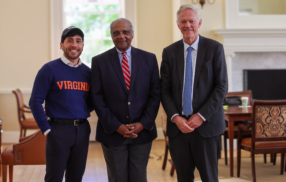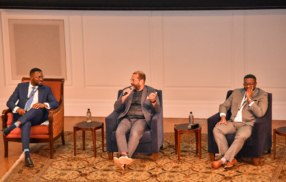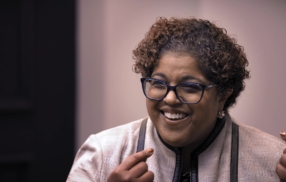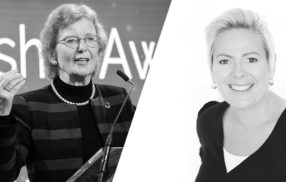Leadership Unscripted: The Future of Media in an Age of Disinformation
By Dave Hendrick
The U.S. media market has been dramatically remade in recent decades, as many once dominant print publications folded or transformed amid the rise of a suite of digital offerings. The fall of the former gatekeepers has upended business models and unleashed a torrent of new forms of information, as podcasts, blogs, newsletters and Facebook posts jockey for user attention.
As president of Atlantic Media, Michael Finnegan (MBA ’07) is an active player in the present and future state of media, overseeing the company’s media portfolio and helping to lead efforts to build sustainable business models for high quality journalism.” Speaking to the University of Virginia Darden School of Business community as part of a Leadership Unscripted event, Finnegan, who also serves as a Darden Dean’s D.C. Fellow, said the appetite for long-format journalism remained robust, even as its various forms mutate.
“Long format will always have a home in America and the world’s global media diet,” said Finnegan, who was joined in conversation with UVA Professor Michael Suarez. “I don’t know that it will be the same slice of time as it used to be.”
As evidence of the continued hunger for long-form journalism, Finnegan noted that some of the viral stories the publication published during the onslaught and height of the COVID-19 pandemic — “You’re Likely to Get the Coronavirus,” — for instance, were at one point drawing 80 to 90 million people per month to theatlantic.com.
“That gives me faith that long format is not going away,” Finnegan said, adding that while high-quality, in-depth pieces can be more popular than ever, what has changed in recent years is distribution and consumption patterns. Those millions of monthly visitors were engaging with the article online, after all, with a significant portion drawn via links shared on social media.
Finnegan further said it was important that future content consumers develop the habit of locating and consuming high quality, ethical journalism.
Suarez, who serves as director of the Rare Book School, an organization based at UVA that studies the history of books and printing, said he sometimes worries the current generation of college students is skilled at consuming information, but can have trouble extracting the knowledge from the information. Ideally, modern students will learn how to convert data to information, information to knowledge, and knowledge to wisdom, Suarez said.
“You need the knowledge piece to get to the wisdom piece,” said Suarez.
One increasing form of knowledge delivery is audio, as small and large publishers seek to meet the consumer demand for podcasts and other forms that can be consumed in a relatively passive manner.
“The ability to multitask with audio is a game changer,” said Finnegan. “These are opportunities to take deep dives into long-form information that doesn’t take away from everything else.”
While audio and other digital means of digital distribution are ascendant, Finnegan said print would remain a going concern, although a print periodical may become more of a “luxury,” — with a more limited role in the role of future generations.
“Magazines and books are going to be more beautiful and more elaborate and audio and digital will become more expedient,” said Finnegan.
Suarez likened the ongoing shift to the world of manuscripts upon the advent of the Gutenberg press, with manuscript runs becoming smaller and more elaborate in the face of speedier replication technology.
The democratization of distribution and rise of all manner of information outlets has also led to the growth of online echo chambers — where many now seem to prefer to receive the news that aligns with their worldview or political leanings — and outlets pushing stories of questionable veracity. Suarez, who called the echo chamber issue “very real,” said professors at UVA are increasingly building “information literacy,” into all manner of courses.
Finnegan said he worries about a future where “good information is predicated on someone’s ability to afford it,” and speculated about a future model where advertisers and consumers enter into an agreement involving a transparent data exchange and ad consumption, with some sort of currency in a digital wallet being used to pay for media.
Listen to the podcast of the discussion
The University of Virginia Darden School of Business prepares responsible global leaders through unparalleled transformational learning experiences. Darden’s graduate degree programs (MBA, MSBA and Ph.D.) and Executive Education & Lifelong Learning programs offered by the Darden School Foundation set the stage for a lifetime of career advancement and impact. Darden’s top-ranked faculty, renowned for teaching excellence, inspires and shapes modern business leadership worldwide through research, thought leadership and business publishing. Darden has Grounds in Charlottesville, Virginia, and the Washington, D.C., area and a global community that includes 18,000 alumni in 90 countries. Darden was established in 1955 at the University of Virginia, a top public university founded by Thomas Jefferson in 1819 in Charlottesville, Virginia.
Press Contact
Molly Mitchell
Senior Associate Director, Editorial and Media Relations
Darden School of Business
University of Virginia
MitchellM@darden.virginia.edu







